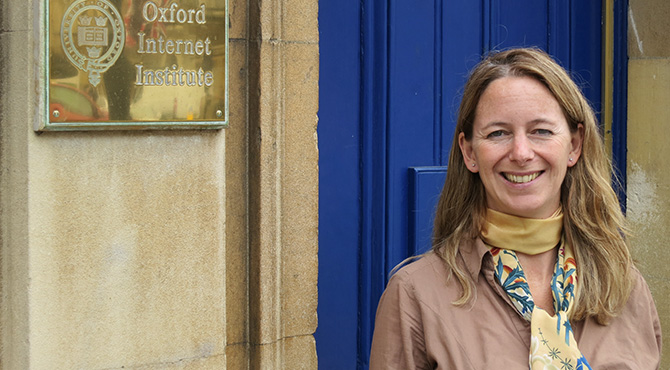
Ms Sarah Porter

Sarah started her career in researching online learning and student experience at Liverpool John Moores University in the early 1990s at the dawn of the world wide web. The project, to allow online access to selected materials, was nominated for the UCISA Teaching and Learning award in 1999 and covered such topics as authentication, encryption, interface design, and assessing the needs, preferences and requirements of online. The project also spanned work with libraries, resource description, digitisation and copyright – laying key foundations for Sarah’s later career.
She then joined the national centre of expertise for digital humanities – the Computers in Teaching Initiative Centre for Textual Studies – at Oxford University in 1996. After two years of promoting cutting edge practice in digital humanities through organising national conferences, workshops and editing a journal, Sarah set up a team to work with academic staff to develop new online learning resources and digital research projects. The Humanities Computing Development Team assisted colleagues from across the University’s teaching and research departments, libraries and museums to create exciting new software systems, web sites, and digital collections – ranging from the University’s first Virtual Learning Environment (created for the Institute of Archaeology), interactive software to help undergraduates to learn the Chinese alphabet, to database-driven websites to open up the exciting artefacts held in some of Oxford’s famous museums for use by students and the general public alike. This included work with the Pitt Rivers Museum and the Museum of the History of Science.
After several years at Oxford and twenty successful projects, Sarah joined Jisc as the Programme Director for e-Learning. In this role, she took on responsibility for UK’s primary strategy for promoting and developing the use of e-learning in education, and with it several million pounds worth of funding programmes. Working with a small and highly skilled team at Jisc, and with a network of experts across the whole UK, Sarah put in place the leading e-learning developments in UK education from the last fifteen years. Early programmes developed virtual learning environments (learning management systems) and managed learning environments, working with leading universities across the whole UK. A suite of activities have explored quality learning experiences, and a series of resources that have been downloaded many millions of times across the world – ranging in topic from designing effective courses, to the use of e-portfolios, social media tools, and digital literac. She also led programmes on open educational resources, digital literacy, curriculum design and delivery, e-portfolios.
In 2007, Sarah was asked to take on the role of Head of Innovation for Jisc. With this, she became a member of the Jisc’s Senior Management Team and took on responsibility for the £25m Jisc innovation portfolio, an exciting range of activities – ranging from digital libraries, resource discovery, and e-research, through to business and administrative systems in institutes, digital literacy, and the digital student experience. Sarah’s team developed innovative strategies where they work in partnership with cutting edge development in leading universities, and supporting take up of successful solutions in a wide range of institutions. These successful models have been heralded and taken up by other organisations in the UK and internationally.
One noteworthy example is the digital repositories programme, which put in place repositories in all UK universities to hold and make available research outputs to an international audience at a time when repositories had not been heard of by most people, and the creation of national resource discovery and information description services that help researchers and students to find and use digital resources from across the world. This includes the development of the Jorum repository of open educational resources (www.jorum.ac.uk), Sherpa ROMEO, KnowledgeBase Plus and many others – all services which are now widely used.
Sarah also led all the key digitisation programmes in the UK in the last ten years, capturing many millions of objects – ranging from thousands of pages of newspapers at the British library, to collections of rare cartoons – that were otherwise not accessible to anyone other than specialist researchers. The impact of this is still to be properly felt, and it will take many years to achieve its full potential, but early evidence shows that it is making a significant difference to the speed of research in some disciplines, allowing new research questions to be formulated and tested, and also opening up key resources to a new generation of learners across the UK.
Innovation activities also focused upon working in close partnership with colleges and universities to support their adoption of new approaches to IT, new systems and methodologies – and sharing the learning from this process openly with others. Of particular note is the flexible service delivery programme where colleges and universities tried out new approaches to the design of some of their key systems – student records, customer relationship management, research support – and shared the outcomes.
With increased emphasis upon the student experience, significant amounts of work focused upon better understanding the digital literacy needs of students (and teaching staff) and creating innovative approaches to addressing this issue. Digital content to support teaching was a key strand and the HEFCE-sponsored open educational resources programme ran over three phases to build up a large body of resources and experience that has put the UK in a strong position, and well-placed to make decisions about new trends and opportunities such as Massive Open Online Courses.
As a visitor at the Oxford Internet Institute during 2013-14, Sarah will be drawing upon her eighteen years’ experience of innovation in higher education to draw conclusions about how universities can better adapt to their current – and future – challenges and to embrace the opportunities that are offered to them through new developments such as MOOCs.
E-learning, innovation, higher education, digital literacy, digital libraries, open educational resources, massive open online courses.